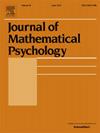Using systems factorial technology for global model analysis of ACT-R’s core architectural assumptions
IF 1.5
4区 心理学
Q2 MATHEMATICS, INTERDISCIPLINARY APPLICATIONS
引用次数: 0
Abstract
Cognitive architectures (CAs) are unified theories of cognition which describe invariant properties in the structure and function of cognition, including how sub-systems (e.g., memory, vision) interact as a coherent system. One problem stemming from the size and flexibility of CAs is deriving critical tests of their core architectural assumptions. To address this issue, we combine systems factorial technology (SFT) and global model analysis (GMA) into a unified framework called SFT-GMA. In the framework, the prediction space is defined in terms of qualitative classes of SFT models, and GMA identifies constraints on this space based on core architectural assumptions. Critical tests are then derived and tested with SFT. Our application of SFT-GMA to ACT-R revealed two key insights: (1) we identified critical tests despite many degrees of freedom in model specification, and (2) ACT-R requires serial processing of perceptual stimuli under most conditions. These processing constraints on perception are at odds with data reported in several published experiments.
使用系统析因技术对ACT-R的核心架构假设进行全局模型分析
认知架构是一种统一的认知理论,它描述了认知结构和功能中的不变属性,包括子系统(如记忆、视觉)如何作为一个连贯的系统相互作用。源于ca的大小和灵活性的一个问题是对其核心体系结构假设进行关键测试。为了解决这个问题,我们将系统析因技术(SFT)和全局模型分析(GMA)结合到一个称为SFT-GMA的统一框架中。在框架中,预测空间是根据SFT模型的定性分类来定义的,GMA根据核心架构假设来识别该空间的约束。然后导出关键测试并用SFT进行测试。我们将SFT-GMA应用于ACT-R揭示了两个关键见解:(1)尽管模型规范中存在许多自由度,但我们确定了关键测试;(2)ACT-R在大多数情况下需要对感知刺激进行串行处理。这些对感知的处理限制与几个已发表的实验中报告的数据不一致。
本文章由计算机程序翻译,如有差异,请以英文原文为准。
求助全文
约1分钟内获得全文
求助全文
来源期刊

Journal of Mathematical Psychology
医学-数学跨学科应用
CiteScore
3.70
自引率
11.10%
发文量
37
审稿时长
20.2 weeks
期刊介绍:
The Journal of Mathematical Psychology includes articles, monographs and reviews, notes and commentaries, and book reviews in all areas of mathematical psychology. Empirical and theoretical contributions are equally welcome.
Areas of special interest include, but are not limited to, fundamental measurement and psychological process models, such as those based upon neural network or information processing concepts. A partial listing of substantive areas covered include sensation and perception, psychophysics, learning and memory, problem solving, judgment and decision-making, and motivation.
The Journal of Mathematical Psychology is affiliated with the Society for Mathematical Psychology.
Research Areas include:
• Models for sensation and perception, learning, memory and thinking
• Fundamental measurement and scaling
• Decision making
• Neural modeling and networks
• Psychophysics and signal detection
• Neuropsychological theories
• Psycholinguistics
• Motivational dynamics
• Animal behavior
• Psychometric theory
 求助内容:
求助内容: 应助结果提醒方式:
应助结果提醒方式:


